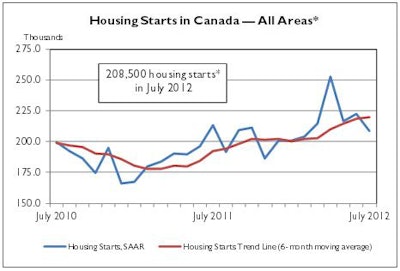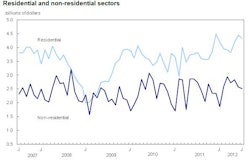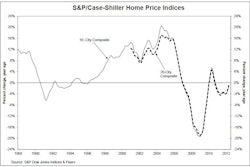
"For the first time in seven months, the July monthly SAAR estimate was below the trend estimate,” said Mathieu Laberge, Deputy Chief Economist at Canada Mortgage and Housing Corp.'s (CMHC) Market Analysis Centre. "The bulk of the July decrease was in the multiples segment (multi-family housing) in British Columbia."
Housing starts in Canada were trending at 219,600 units in July, according to CMHC. The trend is a moving average of the monthly seasonally adjusted annual rates (SAAR) of housing starts. The stand-alone monthly SAAR was 208,500 units in July, 6 percent below June's 222,100 starts.
For some markets, CMHC uses the trend measure as a complement to the monthly SAAR of housing starts to account for considerable swings in monthly estimates and obtain a more complete picture of the state of the housing market. In some situations, analyzing only SAAR data can be misleading in some markets, as they are largely driven by the multiples segment of the markets which can be quite volatile from one month to the next.
The seasonally adjusted annual rate of urban starts decreased by 6.4 percent to 187,300 units in July. Urban single starts decreased by 4.0 percent in July to 64,300 units, while multiple urban starts decreased by 7.6 percent to 123,000 units.
July’s seasonally adjusted annual rate of urban starts increased by 2.0 percent in Ontario and by 3.0 percent in Québec. Urban starts decreased by 29.2 percent in British Columbia, 18.4 percent in Atlantic Canada and by 8.8 percent in the Prairies.
Rural starts were estimated at a seasonally adjusted annual rate of 21,200 units in July.

















